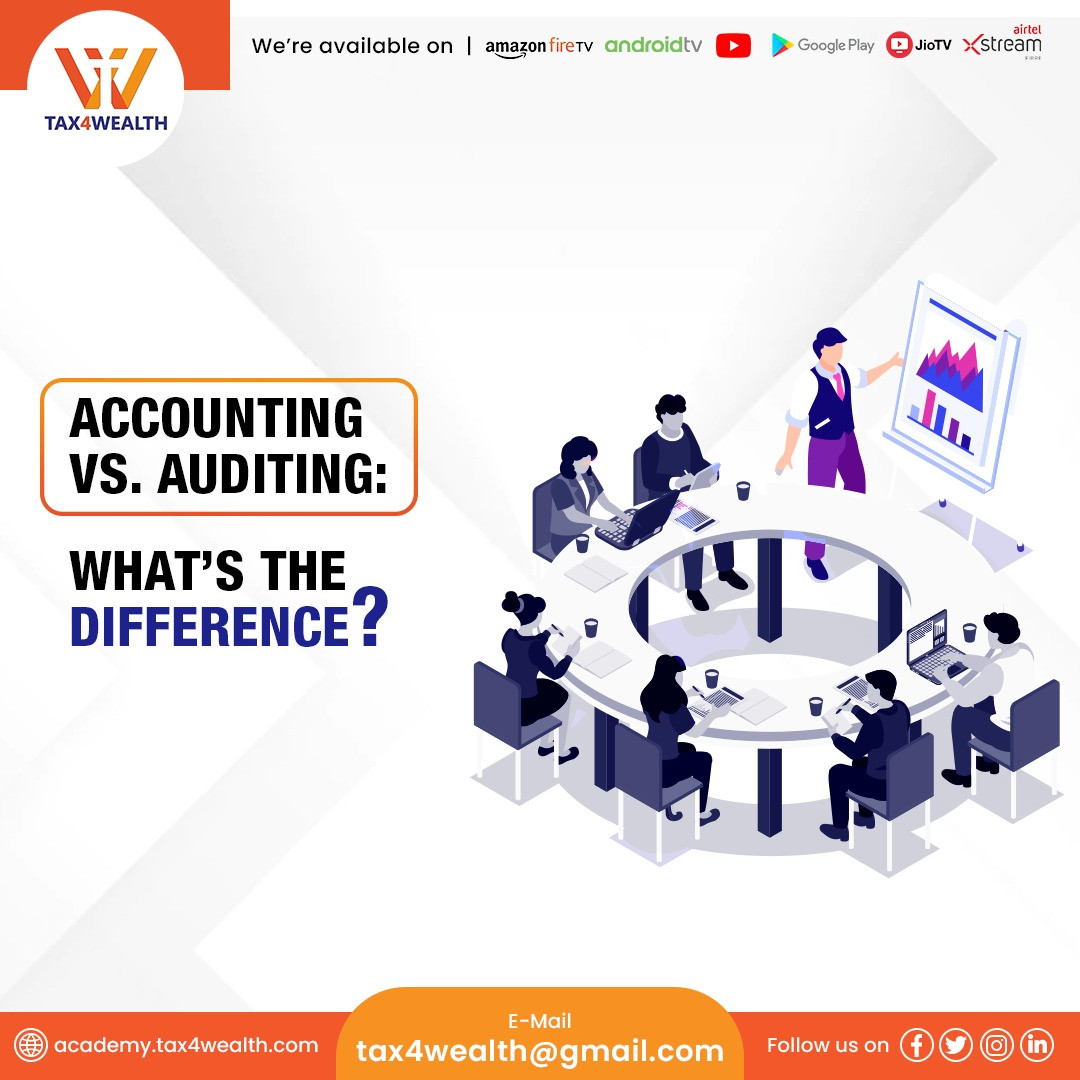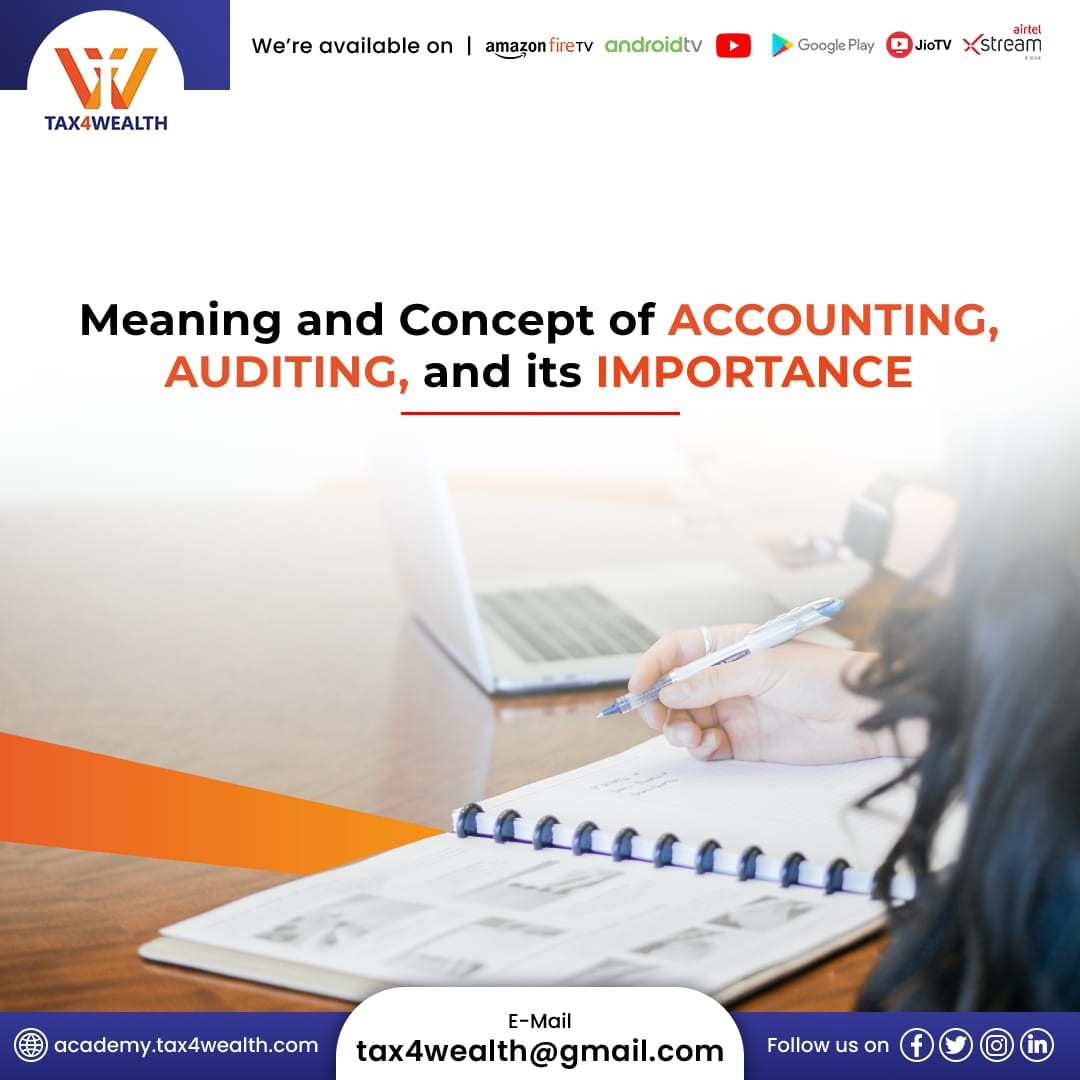
Accounting Vs. Auditing- What’s The Difference?
Both accounting and auditing perform responsibilities related to financial dimensions. Some degree of similarity is also found in the methods of working of both. Due to which the common person understands accounting and auditing as the same, whereas at the basic level, the responsibilities, objectives, procedures of the professionals related to accounting and auditing are different. Accountant, being an internal person of the company, who sometimes conducts audit in the course of discharge of his day-to-day affairs. On the other hand, the auditor is an outsider of the company who is called to examine and examine the financial statements and procedures of the company. Certainly online accounting courses and online tally courses are very beneficial in making a career as an accountant and auditor.
What is Accounting?
Accounting generally refers to the work in which the financial statements of a company or business are kept in a systematic manner. The financial nature of the business is clarified under accounting by preparing the details of monthly, quarterly, and annual cost, savings, loss, profit of the business.
What is The Accountant's Responsibility?
An accountant records the financial statements of each transaction under the business. The accountant ensures that there is due compliance of the tax laws in the company. Provides forecasting to management about the consequences of financial decisions. Accountants should assist in the preparation of the company's budget and suggest economy. The accountant compiles the monthly, quarterly, and annual cost, savings, loss, and profit statements of the business and provides information on the financial nature of the business in high-level managerial meetings. Streamlined operation of accounts is a basic requirement for the growth of any business. This enables optimum utilization of the resources of the business. Once the financial structure is clear, future plans are formulated and implemented on a practical basis.
Accountant performs the responsibility of accounting. Every financial statement relating to business transactions, cash payments, assets and liabilities is recorded by the accountant and on the basis of this statement, the management evaluates and analyzes the financial position of the business. It is possible to do. Based on his day-to-day work, an accountant can also advise business managers on a systematic strategy in terms of financial rules. An accountant based on his experience also helps in building a smooth and consistent financial model for the business in the competitive environment. Also, a qualified accountant strives to comply with accepted accounting standards in filing financial statements. So that accounting can be done in an accurate and efficient manner.
What is auditing?
Under audit, the financial statements of the company or business are verified. Auditors try to find out how consistent the financial statements are with the accepted rules of the organization. The audit sees whether the financial expenditures were used accurately and efficiently in the context of accounting principles, government laws and business requirements. How effectively are the fraud detection and prevention efforts working?
Also read: Meaning and Concept of Accounting & Auditing and its Importance.
What is The Auditor's Responsibility?
The auditor examines the financial statements of any company or business and verifies the recorded data. The auditor sees whether the financial statements reflect the true financial nature of the business. There has been no fraud in the financial transactions. Auditors are generally members from outside the organization and work under the provisions of accepted auditing standards, applicable laws on behalf of shareholders or regulators. The limits of the auditor's work are determined by applicable laws. Auditing standards are issued by the International Auditing Board, which are mandatory to be followed during audit.
What are The Similarities Between Accounting and Auditing?
The functions and responsibilities of accounting and auditing are different but there are some similarities between the two. like:
1. The skills of an accountant and an auditor are mostly similar.
2. Both the accountant and the auditor have to prepare a number of financial reports. Therefore, they should be able to communicate financial information in a clear manner.
3. The accountant and auditor also have to make suggestions from the analysis of the financial position of the business. So they have to possess mathematical and logical skills.
4. Both the accountant and the auditor must be proficient in computer skills and organization skills and have a fine-grained focus to spot discrepancies.
What is The Difference Between Accounting and Auditing?
While an accountant tries to keep the financial statements accurate, the auditor examines the accuracy of the statements.
While the accountant focuses on the detail aspect while collecting the financial data on a daily basis, the auditor focuses more on the analysis aspect when he prepares his report.
Accountants and auditors are usually officers of the same level while external auditors are higher level officials.
While the accountants perform the work of recording financial statements on a day-to-day basis, i.e. recording records, preparing estimates, budgeting, financial monitoring, auditors focus on periodic verification of financial statements and preparation of audit reports. .
Accountants prepare their financial reports on the basis of prepared daily financial statements whereas auditors express their opinion on the financial statements by preparing audit reports.
Auditing takes place only after accounting. While accounting is a daily process, auditing is generally a yearly process.
The basis of accounting is broad, containing every possible financial statement of the business, while auditing generally uses financial statements and records on a sample basis.
Even at the test stage, where all financial statements are checked in accounting, samples are used as the basis for examination in auditing.
The main focus of accounting is on recording all financial statements with accuracy, while the main focus of auditing is on verification of financial statements and evaluation of reliability.
The main purpose of accounting is to determine the financial position, profitability, and financial performance of the business while the main purpose of auditing is to uncover irregularities.
Accounting is to some extent based on the standards of accounting which have scope for flexibility but auditing is governed by strict standards of auditing which do not allow much flexibility.
While the accounting is done by an internal employee of the company, the audit is done by an outside person or an independent agency, so there is a greater degree of strictness and fairness.
Accountants are appointed by the company's management whereas auditors are generally appointed by the company's shareholders or regulators.
The accounting is done by the employee of the company so where he gets regular salary, a special fee is paid to the auditor.
The limits of accounting are set by the managers of the company whereas the limits of auditing are determined by the level audit standards.
An accountant can be removed by a manager but an auditor can be removed only with the consent of the shareholders.
An accountant cannot be sued for professional misconduct whereas an auditor can be sued for professional misconduct under the applicable rule.
Accounting is essential for the day-to-day operations of any organization but the need for auditing on a daily basis is not visible for any organization.
Auditing for verification of details along with accounting of financial statements is an essential fact for smooth functioning of any business. Accounting and auditing have some similarities in techniques and procedures, but there are many differences as well, but accounting and auditing appear to be complementary to each other for the business success of any company.
Related News
No comments yet, Be the first to comment.













